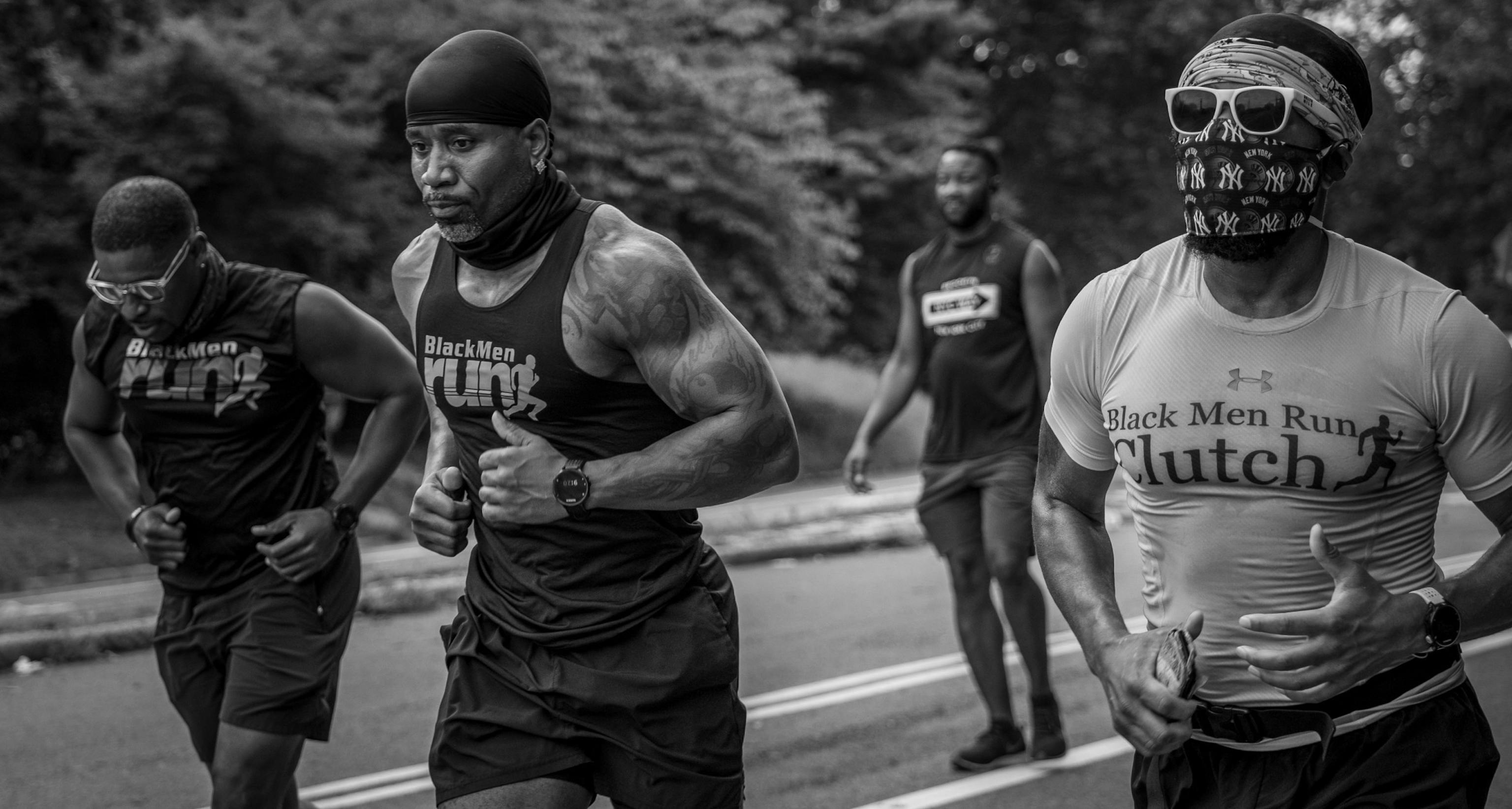

No Man Left Behind
Words by Sarah Gearhart
Photography by Shawn Pridgen
Jesse Spellman’s black tank top clings heavy against his chest, sweat sliding down him as though he was doused with water. The Brooklyn humidity punches through the 75-degree air, making it feel closer to triple digits.
But he always shows up.
On this Sunday morning, the 37-year-old post-production manager is supposed to be on a “casual” four-mile run in Prospect Park with his team, Black Men Run (BMR) New York City. But his body wants more, and his feet hunt the pavement, welcoming a correlating rhythm pumping in his chest. He’s thinking about inching closer to his monthly tally of 120 miles, a number he has averaged for the past two years. And 2020 will be no different: at least 1,000 miles by year’s end, a considerable portion logged with BMR.
Approximately 100 men make up the team in New York, which was established in the fall of 2013. The group originated in Atlanta, Georgia, captained by co-founders Jason Russell and Edward Walton, who encouraged men to come out and run. The intent since BMR’s inception was to promote health and wellness among Black men along with a culture of running, resulting in what Russell and Walton describe as “a Healthy Brotherhood.”
Since Russell and Walton’s original Facebook post that initiated the first organized group run, through grassroots expansion, BMR Nation is now more than 50 teams deep across the U.S. as well as teams in London and Paris.
“Black Men Run, as a concept, I feel is culturally appropriate,” says Keron Alleyne, who has been a member of the NYC chapter since 2014. “My reason for [getting into] running is health and wellness related. It wasn’t about races or being the fastest or running marathons. The organization exists to break the mold and encourage Black men to run, to create a safe space, to have a support system as they grow in their running journey.”
That is why Spellman shows up.
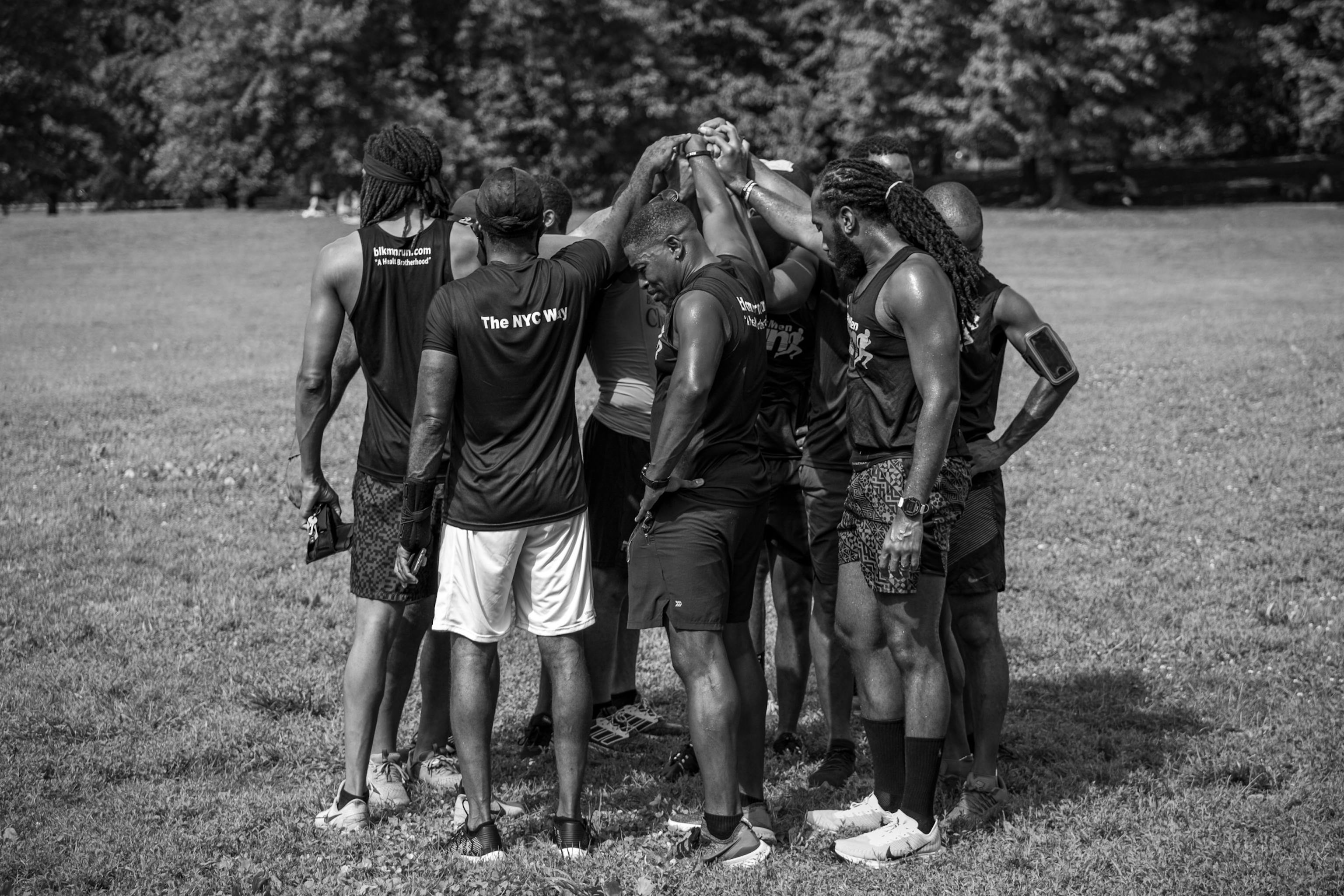
This time last August, he was nearly five weeks out from running the Berlin Marathon. If he could train for another race with these guys, he would. But by no fault of his own, plans to run marathons in New York City and Toronto in 2020 were scratched following a domino of race cancellations due to the Covid-19 pandemic.
And yet Spellman is still out here, welcoming a heavy feeling that saturates his lungs and legs as he shuffles around Prospect Park with a dozen other guys.
He does it “to keep my legs honest,” he says, and to be around examples of hard-driving men that illustrate consistency and purpose. Spellman’s motivation runs deep, as do all the members of BMR New York City.
Guys like captain Brandon Jackson, who can “sub-four with ease”; Richard Scott, who qualified for the Boston Marathon three times in 2019; Alleyne, who ran for New York state senate in 2020. And Dubar Smalls, AKA “Young Dubee,” the 15-year-old whom Spellman says is one of the fastest and most competitive guys on the team. “I can’t keep up with him,” Spellman laughs. “He has another gear.”
Young Dubee has been a part of BMR New York City since he was 11. Being around the team – a collective of nurses, doctors, professors, community activists, entrepreneurs, teachers and transit workers – has pumped his ambitions. “I don’t want to take it easy,” he says. He’s convinced the obligation is on him to work just as hard, if not more, to demand just as much from himself, if not more.
Young Dubee is not alone in growing into himself under the influence of the team. Spellman credits BMR for teaching him how to take care of his body and his mind, something he had no healthy exposure to as a “project kid” in Canarsie, a neighborhood in southeastern Brooklyn.
“Growing up there, you make do with what you have,” he says. “We weren’t taught proper care, by that I mean diet. We weren’t taught about the negative impact of processed foods, how to eat healthy. We didn’t have access.”
Since Spellman joined BRM in 2016, he recognizes that he has become a different version of himself. The amateur of six years ago, when he first started running, would lace up in a pair of basketball sneakers, throw on a cotton T-shirt and shorts and run mindlessly toward Far Rockaway.
Had he not made the effort to run in the first place, perhaps he would add to a statistic: heart disease currently ranks as the No. 1 cause of death among Black men, according to the Center for Disease Control; 44.4% of Black men age 20 and older suffer from cardiovascular diseases. BMR aims to change this for the better.
Improving health together is a major objective. A resulting camaraderie is what caught Spellman the first time he met the team just inside the entrance of Grand Army Plaza on a hot Sunday morning four years ago. This sliver of Prospect Park has been their meeting point at 9:15 a.m., every Sunday for the past seven years. Spellman remembers standing among a dozen other men dressed in matching T-shirts with “Black Men Run” scrolled across their chests and the ensuing intimidation that enveloped him. “You see guys who know how to run and the question to yourself is, ‘Can I keep up?’”
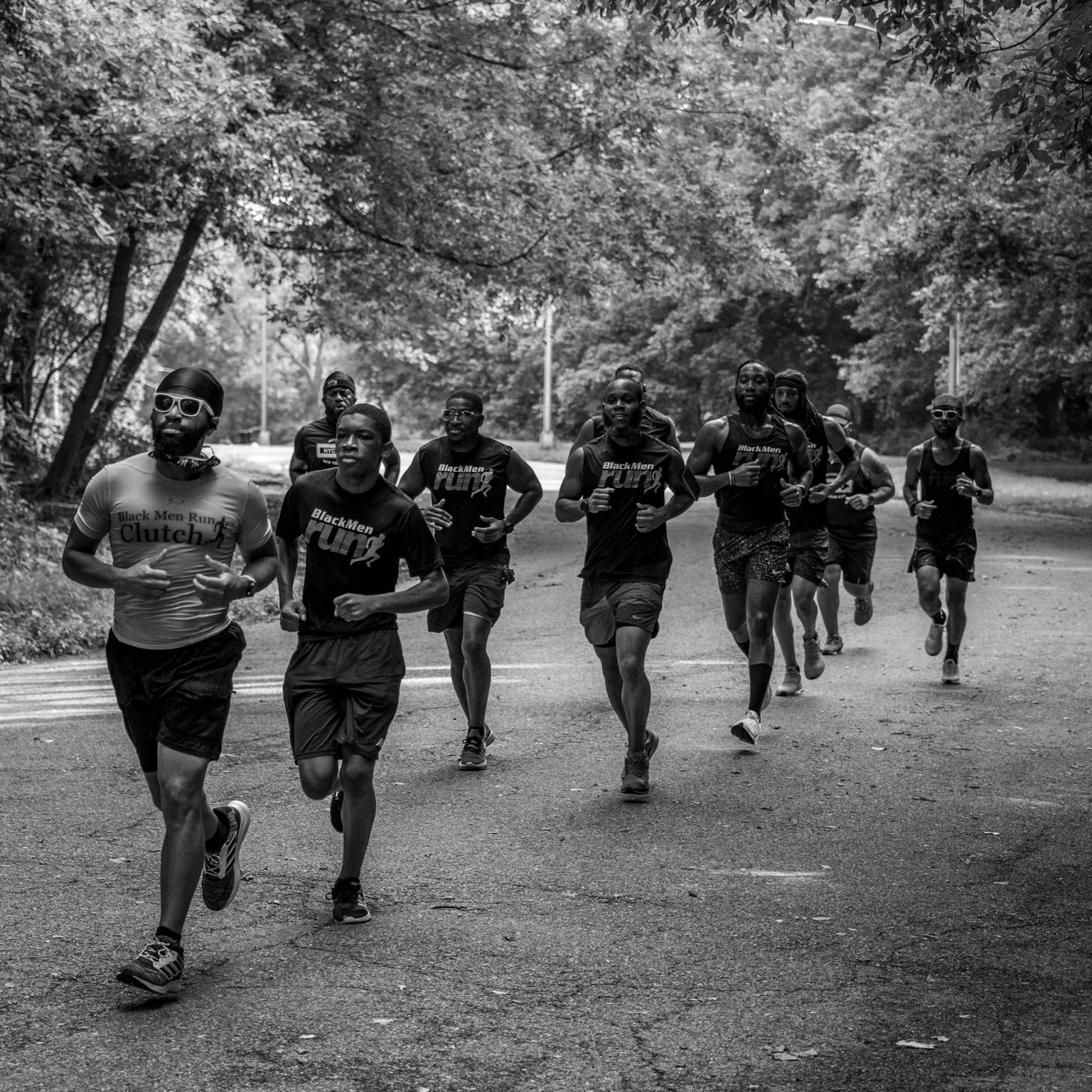
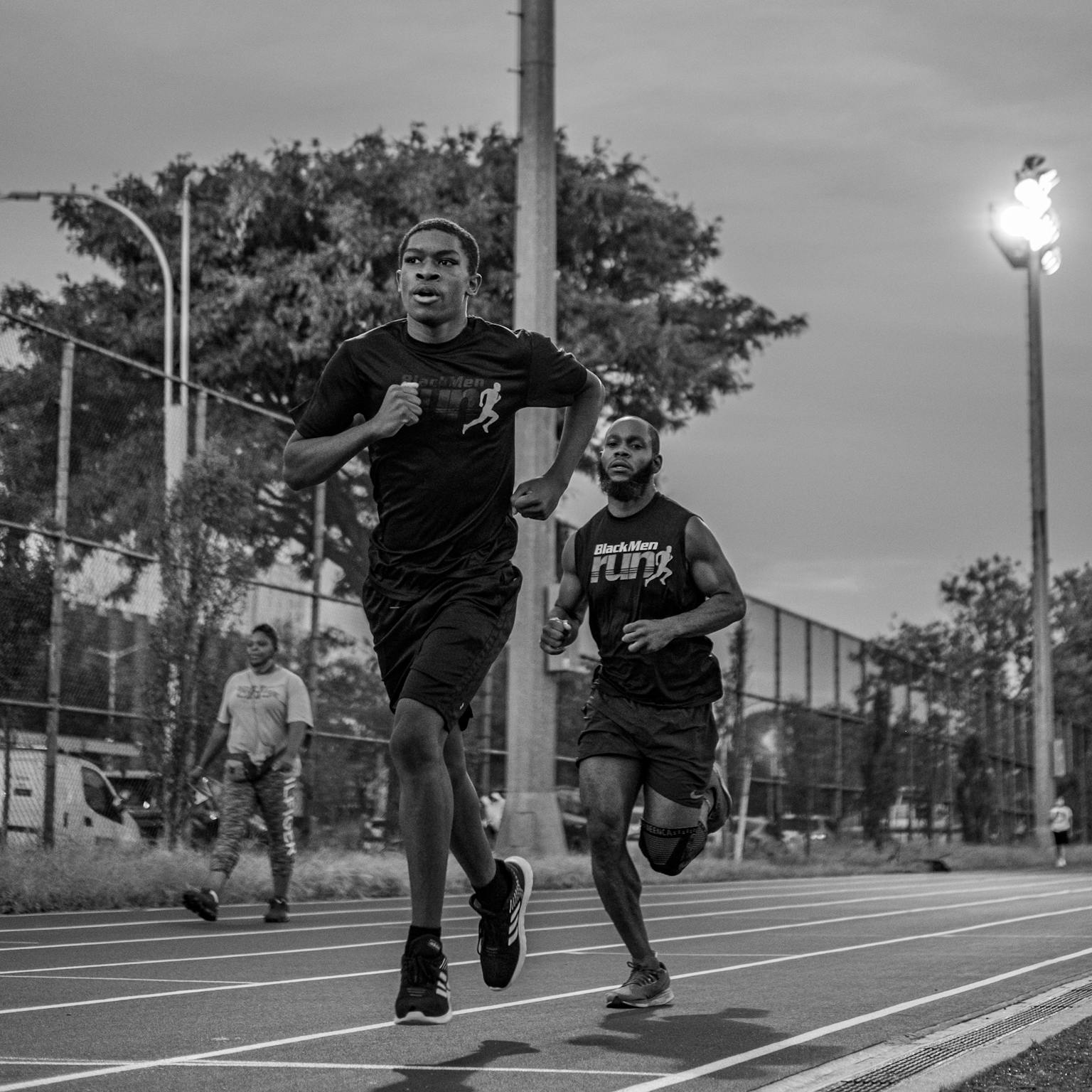
His intent has been there since day one, when he struggled through a stair workout, and the knot in his stomach from the intensity nearly swayed him to give up.
“I got you, Brother,” he heard another member shout. “We’ll get you to the end. I’m not going to leave.” They kept going.
“That hit me,” Spellman remembers. “I was speechless.” And that’s when he realized, “these Brothers will not let you fail.”
What continues to draw him out on Sunday mornings is a sense that there is a goal larger than running: to make each other better all around. Over the years it’s allowed him to see a world of potential, like pushing himself to complete five marathons and 13 half marathons. And to learn about the positive effects of being meatless, which ultimately influenced him to adopt a primarily vegan diet after conversations with the team’s captain Kovon Flowers, also a vegan. “This is the healthiest I’ve ever been,” Spellman says.
BMR New York City, which is comprised of runners of all sizes, ages and athletic abilities, also exposed him to a relatable support system.
“As Black men, we understand that we need to be leaders amongst our community, not only in running,” says Alleyne, a three-time marathoner. “The [BMR] culture transcends running. It’s understanding that we play an intricate role in our society.”
Adds Curtis John, the team’s manager, “Us all being Black men and doing this activity together is also really powerful and that was an instant thing that I felt.”
BMR’s agenda is to lead by example, something members do outside of sport. In years past, that has ranged from attending a peaceful rally organized by the NAACP, advocating for equal representation in media, fundraising for St. Jude’s Children’s Research Hospital, supporting the Children’s Aid Society, standing up against violence. The list is ongoing.
And yet despite the exclusively positive stance that penetrates BMR, Alleyne is honest about having a heightened awareness, because as he explains, “There is a certain treatment that Black men receive in all walks of life. This could be seeking employment, definitely walking down the street, an experience with police, the outward view of who and what you are because you are a Black man. There are extreme stereotypes that we have to battle on the regular.”
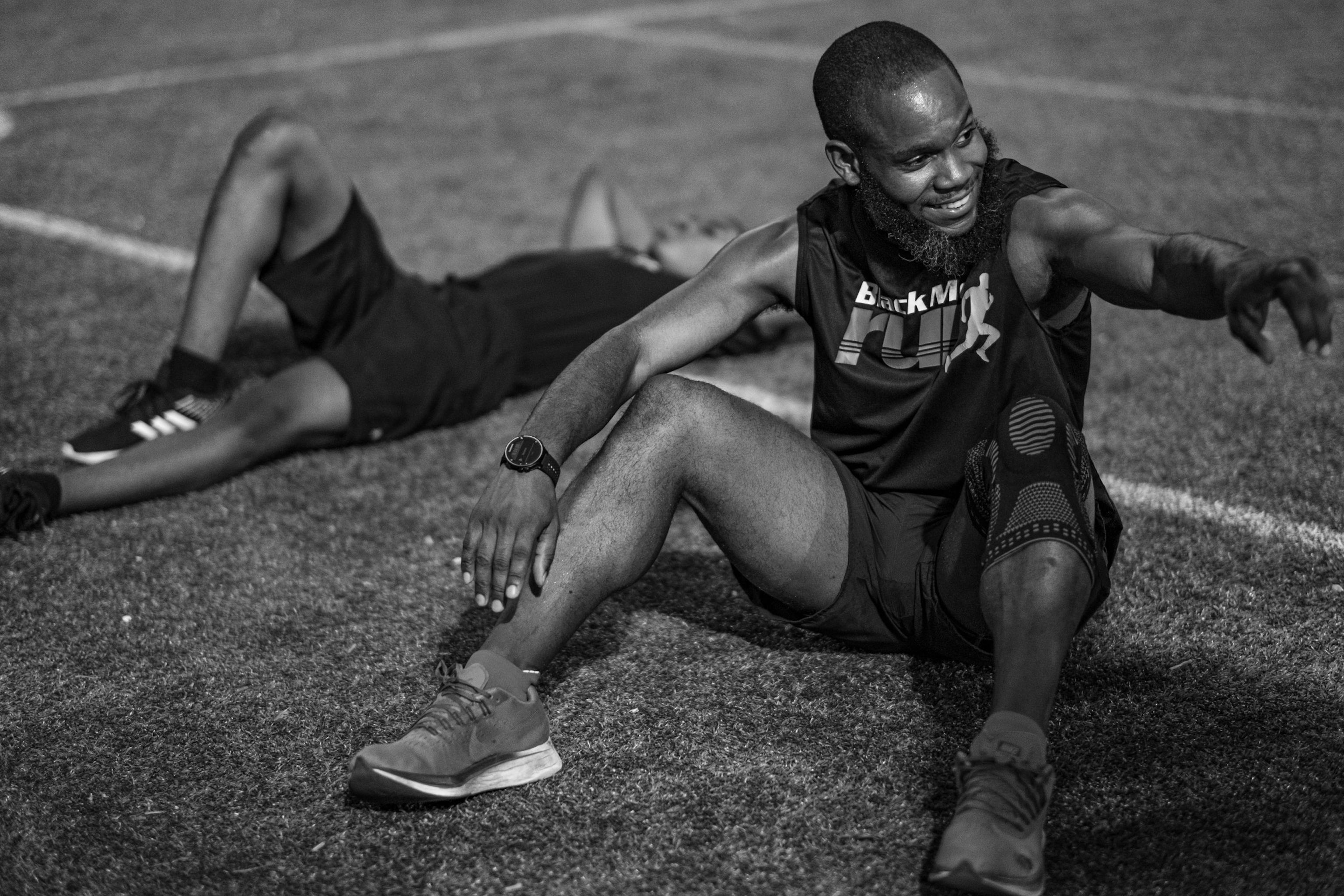
It’s a continuing conversation within BMR about “certain things that your Brothers can relate to,” Spellman says. Like wanting to feel safe while running. The unwarranted death of Amaud Arbery, an unarmed 25-year-old Black man who was fatally shot in Glynn County, Georgia, while jogging, only added to their discourse.
“That could be any one of us,” Alleyne says. “We’ve seen ourselves in so many other instances well before Amaud Arbery.” Eric Garner, Philando Castile, Michael Brown, Trayvon Martin.
Alleyne and Spellman both say they’ve been stopped by the police without cause while on the run, occasions that have led them each to revise their personal and work schedules in order to run at times they feel more secure. Weekly runs with BMR offers that. “The energy is different compared to running solo,” Alleyne says.
And a shared passion for running in the company of men who show up for each other is why Spellman and Alleyne keep coming back.
“It’s very important that Black communities see Black men running,” Alleyne says. “It’s more than just being out there for the four or five miles that we do collectively. It’s about example, representation and leaving footprints for those to follow.”